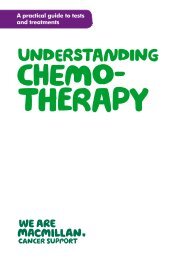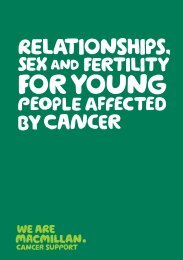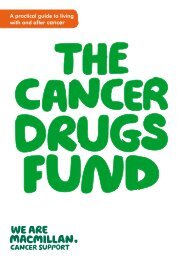The cost of Macmillan services - Macmillan Cancer
The cost of Macmillan services - Macmillan Cancer
The cost of Macmillan services - Macmillan Cancer
Create successful ePaper yourself
Turn your PDF publications into a flip-book with our unique Google optimized e-Paper software.
5In 2011, we reached over 433,000 cancer patients through our <strong>Macmillan</strong> Nurses. Inaddition to these patients, our <strong>Macmillan</strong> Nurses helped many more carers, familymembers and friends.In 2011, the average <strong>Macmillan</strong> Nurse helped 137 cancer patients across the whole year.AHPsAHPs are Allied Healthcare Pr<strong>of</strong>essionals, who work alongside nurses and doctors toprovide a comprehensive range <strong>of</strong> cancer healthcare support, including rehabilitationsupport. Examples <strong>of</strong> AHPs are given below.In 2011, we reached over 85,800 cancer patients through our <strong>Macmillan</strong> AHPsIn 2011, the average <strong>Macmillan</strong> AHP helped 161 patients across the whole year.Example <strong>of</strong> AHPs include:lymphoedema specialists – lymphoedema is a condition that causes swelling <strong>of</strong> thelimbs, as a consequence <strong>of</strong> their cancer or its treatment. Our specialists providetherapy that includes massage, bandaging, exercises and skincare and supportspeople to self-manage their condition wherever possible.physiotherapists – by using special exercise or massage therapy, these specialistshelp people with cancer to maintain their independence, mobility and regain any loss<strong>of</strong> function as a result <strong>of</strong> their illness or its treatment.dietitians – they give dietary and nutritional advice and support people with cancer.During treatment some people experience a loss <strong>of</strong> appetite or nausea that mightresult in weight loss. Others may have long-term side effects as a result <strong>of</strong> surgery ortreatment and might need to change their diet.pharmacists – they prepare drugs and dispense medicines prescribed by doctors,oncologists or nurses for the treatment <strong>of</strong> cancer. <strong>The</strong>y also provide information forpeople with cancer and their families so that they can self-manage their medicines.information radiographers – they work closely with clinical oncologists in the field <strong>of</strong>radiotherapy. <strong>The</strong>y provide support to people with cancer and make sure they haveall the information they need about their particular cancer type and its treatment.occupational therapists – they help people manage day-to-day activities, arrangingfor them to receive any special equipment they need to adapt to being back at homeafter cancer treatment. <strong>The</strong>y also provide information and support to enable people toget back to work or education.speech and language therapists – they work with people who have speechdifficulties, or problems swallowing following cancer treatment.Questions about living with cancer?Call the <strong>Macmillan</strong> Support Line free on 0808 808 00 00 or visit macmillan.org.uk<strong>Macmillan</strong> <strong>Cancer</strong> Support, registered charity in England and Wales (261017), Scotland (SC039907) and the Isle <strong>of</strong> Man (604). A company limited by guarantee.Registered company in England and Wales (2400969) and the Isle <strong>of</strong> Man (4694F). Registered <strong>of</strong>fice: 89 Albert Embankment, London SE1 7UQ.
















